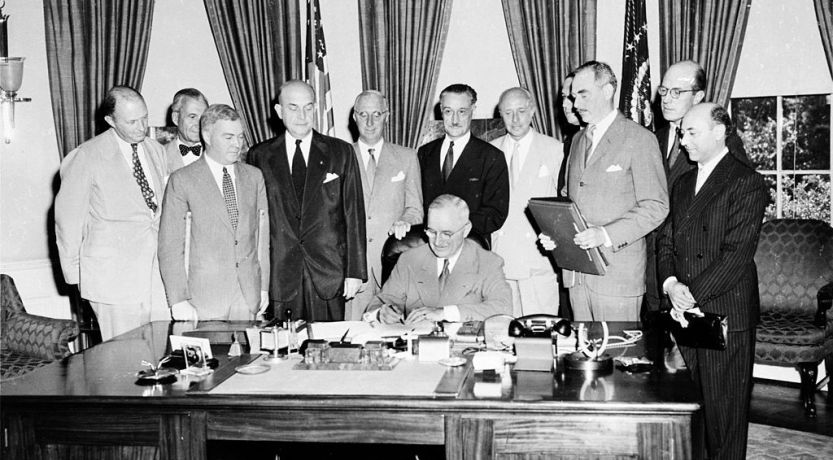70th Anniversary of NATO: Are Its Days Numbered?
With President Trump’s push for European nations to pay for their own defense and America’s growing isolation from Europe, are NATO’s last days drawing near as we approach its 70th anniversary?

Just over six months before the end of World War II, the Allied powers met at Yalta to discuss the future of Europe after the war. Hitler’s Germany was almost totally defeated, and Europe lay largely in ruins, economically and militarily decimated.
U.S. President Franklin D. Roosevelt, British Prime Minister Winston Churchill and Soviet Premier Joseph Stalin divided post-war Europe between the Western powers and the Soviet Union. At the conference they made some key decisions about Europe’s future, including that:
- Nazi Germany must unconditionally surrender.
- Germany would be divided into four zones controlled by the victors: the United States, Great Britain, France and the Soviet Union.
- Germans would pay reparations for losses caused to the Allied nations.
- Poland would be left under the control of a pro-Communist provisional government dominated by the Soviet Union, with a vague plan to hold free elections later.
- A conference to form the United Nations would be held April 25, 1945, with five nations, including the Soviet Union, receiving a permanent seat on the Security Council.
The post-war strategic importance of NATO
After the war, it became clear that Joseph Stalin could not be trusted. He did hold elections in Poland but used Soviet troops to eliminate the non-Communist opposition. Poland provided the U.S.S.R. with a protective buffer from Western Europe and an area of Soviet influence in Eastern Europe.
In 1947 and 1948 the Soviet Union organized and supported a Communist coup in Czechoslovakia and implemented the Berlin Blockade, limiting access to West Berlin (which was located within Soviet-controlled East Germany).
This map shows the current member states of NATO. 
With Europe laid waste after the war, NATO provided the security necessary for the rebuilding of European industries and food production funded by the Marshall Plan. The Soviets refused to participate in the rebuilding of Europe or allow any Eastern European states to receive aid, heightening the distrust between the East and West.
NATO was successful at accomplishing its strategic goals. It kept Western Europe safe and secure from Soviet aggression in its delicate post-war rebuilding years; it helped West Germany to rebuild itself, peacefully integrated into Europe; and it helped ensure that Western Europe would be rebuilt along the Western economic and political model.
Fast-forward 70 years to today, and the role and future of NATO is uncertain. As America under President Donald Trump retreats from the world stage, are NATO’s days numbered?
A broken relationship
The United States was instrumental in the rebuilding of West Germany. When the Berlin Wall began to fall in 1989, the U.S. was ready to assist with the reunification of East and West Germany.
But since then a lot has happened between the United States and Germany. A number of factors have caused a significant rift between the two powers.
The first major incident occurred when Germany broke ranks with the U.S. and opposed the 2003 Iraq War. Germany openly criticized the war and refused to contribute troops, supplies or financial backing. The fiasco and chaos that developed in the aftermath of the Iraq invasion was seen to validate the German position and increase distrust of the U.S. in Europe.
In more recent times, the German-American relationship has been further stressed by President Trump’s continual rebukes of the European nations (particularly Germany) for not paying their fair share for European defense, by his open criticism of the German-U.S. trade imbalance, by threats of U.S. steel tariffs against Germany, and by U.S. withdrawal from the Paris Climate Agreement and the Iran nuclear deal.
In 2017, after returning from NATO and G7 meetings with recently inaugurated President Donald Trump, German Chancellor Angela Merkel made this significant statement at an election rally: “The times in which we could completely depend on others are on the way out” and “we Europeans have to take our destiny into our own hands.”
Her point was clear: Germany and Europe could no longer rely on the United States.
With Brexit further straining continental European relations with the two most powerful English-speaking powers, Chancellor Merkel has gone further by joining France in calls to build a European army designed to keep Europe secure apart from NATO and the United States. French President Emmanuel Macron even went so far as to call for the formation of a European army to protect Europe from Russia, China and the United States! President Trump later called President Macron’s comments “very insulting.”
A recent poll showed that 73 percent of Germans think the German-American relationship is bad. Will the relationship between these two powerful nations be healed?
Europe on the rise and America on the retreat
After the 9/11 attacks, the U.S. embarked on two major wars in Afghanistan and Iraq. Both wars turned out to be bitter and protracted conflicts with no clear victory in sight. Almost 18 years later, American forces have still not totally defeated their enemies in the region or neutralized the possibility of their enemies’ return to power.
As the U.S. retreats from the world, instability increases. In a recent speech in Cairo, U.S. Secretary of State Mike Pompeo said, “We learned that when America retreats, chaos often follows.” However, President Trump has made threats to withdraw from NATO and from war fronts such as Syria, Iraq and Afghanistan.
Because of all these trends, it seems very possible that NATO could be phased out in the coming years and replaced with a European military independent of the U.S. and U.K.
Bible prophecy shows that the next world superpower will rise out of Europe and will eclipse the U.S. and U.K. in political, military and economic power. A European army could likely be propelled forward by continuing threats from a resurgent Russia in the east and an ever unstable Middle East to the south. Meanwhile, the world scene will see the continued weakening of the English-speaking nations.
As NATO reaches its 70th anniversary, its future seems more uncertain than ever.
Date Posted: April 3, 2019



